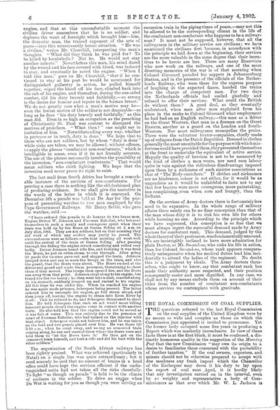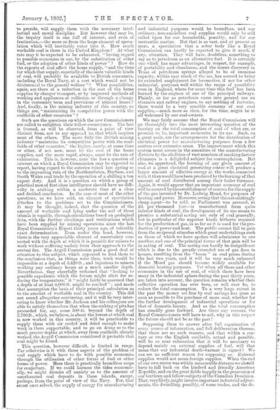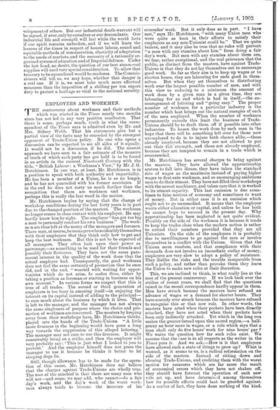THE ROYAL COMMISSION ON COAL SUPPLIES.
T"questions referred to the last Royal Commission on the coal supplies of the United Kingdom were by no means so wide and complex as those on which the Commission just appointed is invited to pronounce. Yet the former body occupied some five years in producing a Report which was markedly inconclusive. In view of these facts there is at the first blush, it must be confessed, a dis- tinctly humorous quality in the suggestion of the Morning Post that the new Commission " may owe its origin to a desire to familiarise those concerned with the probability of further taxation." If the coal owners, exporters, and miners should not be otherwise prepared to accept with due meekness any fresh impost which the Chancellor of the Exchequer may deem it his duty to lay upon the export of coal next April, it is hardly likely that any investigation carried on in the interval, even by so weighty and representative a body of Com- missioners as that over which Mr. W. L. Jackson is to preside, will supply them with the necessary intel- lectual and moral discipline. But however that may be, the inquiry itself is one full of interest, and even of fascination,—the more so from the large element of specu- lation which will inevitably enter into it. How much workable coal is there in the United Kingdom ? At what rate may it be-expected to be exhausted, " having regard to possible economies in use, by the substitution of other fuel, or the adoption of other kinds of power " ? How do the exports of coal affect the home supply, " and the time for which that supply, especially of the more valuable kinds of coal, will probably be available to British consumers, including the Royal Navy, at a cost which would not be detrimental to the general welfare" ? What possibilities, again, are there of a reduction in the cost of the home supplies by cheaper transport, or by improved methods of working and appliances at collieries, or through a change in the customary term and provisions of mineral leases ? And, finally, is the mining industry of this country, as things are, "maintaining its competitive power with the coalfields of other countries " ?
Such are the questions on which the new Commissioners are called to enlighten their fellow-countrymen. The last is framed, as will be observed, from a point of view distinct from, not to say opposed to, that which inspires most of the others. The more fully the British mining industry " maintains its competitive power with the coal- fields of other countries," the higher, surely, at some time or other, if not now, must be the cost of the home supplies, and the more rapid, always, must be the rate of exhaustion. This is, however, none the less a question of interest on which a Royal Commission may be expected to report, having regard to the outcries raised last spring as to the impending ruin of the Northumbrian, Durham, and South Wales coal trade by the operation of a shilling a ton export duty. And it is a question on which a group of practical men of first-class intelligence should have no diffi- culty in arriving within a moderate time at a clear and decided conclusion. In the case of most of the other questions, as we have said, an element of speculation attaches to the problems set to the Commissioners. It may be thought, indeed, that the question of the amount of workable coal lying under the soil of these islands is capable, through calculations based on geological data, with the further checkings and verifications which have been supplied by mining operations since the last Royal Commission's Report thirty years ago, of tolerably exact determination. Even under this head, however, there is the very appreciable element of uncertainty con- nected with the depth at which it is possible for millers to work without suffering unduly from their approach to the central fire. The Argyll Commission paid a good deal of attention to this subject, which appeared to lead them to the conclusion that, as things were then, work would be impossible at a depth of 3,420 ft , and injurious to miners working any ordinary hours at a much smaller depth. Nevertheless. they cheerfully reckoned that " looking to possible expedients which the future might elicit for re- ducing the temperature," it " might fairly be assumed that a depth of at least 4,000 ft. might be reached" ; and made that assumption the basis of their principal calculation as to the amount of workable coal in the country. This did not sound, altogether convincing, and it will be very inter- esting to know whether Mr. Jackson and his colleagues are able to satisfy themselves that when the sinking of pits has proceeded for, say, some 500 ft. beyond the depth of 2,700 ft., which, we believe, is about the lowest at which coal is now worked in this country, it will be practicable to supply them with air cooled and dried enough to make work in them supportable, and to go on doing so to the much greater depths at which, away from coalfields already worked, the Argyll Commission considered it probable that coal might be found.
This question, however difficult, is limited in range. Far otherwise is it with those aspects of the problem of coal supply which have to do with possible economies through the utilisation of other forms of fuel or other forms of power. Here there is practically boundless scope for conjecture. If we could harness the tides economic- ally, we might dismiss all anxiety as to the amount of unexhausted coal deposits in these islands, except, perhaps, from the point of view of the Navy. For, that secret once solved, the supply of energy for manufacturing and industrial purposes would be boundless, and our ordinary, non-smokeless coal supplies would only be still called upon for our households, possibly, and for our mercantile marine. But that is so vast, and at present so mere, a speculation that a sober body like a Royal Commission can hardly be expected to give it much, if any, attention. They will have, doubtless, something to say as to petroleum as an alternative fuel. It is certainly one which has many advantages, in respect, for example, of portability and cleanliness, and the recent discovery in Texas of petroleum springs alleged to be of immense capacity, within easy reach of the sea, has seemed to bring its extended employment for locomotive, if not for other industrial, purposes well within the range of possibility even in England, where for some time this fuel has been burned by the engines of one of the principal railways. Plainly, so far as petroleum came into general use on steamers and railway engines, to say nothing of factories, there would be a very sensible economy of our coal supplies,—much more so than, for the time, might be at all welcomed by our coal-owners.
We may fairly assume that the Royal Commission will go thoroughly into the most interesting question of the bearing on the total consumption of coal of what are, or promiso to be, important economies in its use. Such, on a great scale, are the arrangements for the distribution of electrical power for manufacturing purposes from a few centres over extensive areas. The improvement which this system must secure in the amenities of the manufactering districts by the abolition of vast numbers of smoking factory chimneys is a delightful subject for contemplation. But also, we apprehend, the burning of any given amount of coal at a great electrical generating centre will produce a larger amount of effective energy at the works connected with it than would have been produced by the burning of that amount of coal distributed among their boiler furnaces. Again, it would appear that an important economy of coal will be secured by the establishment. of centres for the supply of the gas invented by Dr. Ludwig Mond, for purposes of heating and power. Moreover, seeing that this astonishingly cheap agent—to be sold, so Parliament was assured, at 2d. per thousand feet—is manufactured from quite inferior kinds of coal, the development of its use seems to promise a substantial saving not only of coal generally, but in particular of the superior kinds hitherto required for the production of gas, in so far as it is used for the pro- duction of power and heat. The public cannot fail to gain from the reciprocal stimulus which great undertakings such as those of which we have spoken will administer to one another, and one of the principal forms of that gain will be in saving of coal. The saving can hardly be insignificant which is due to the greatly extended use of gas fires in houses, resulting from the " boom " in coal prices during the last two years, and it will be very much enhanced if the Mond gas should become widely available for domestic heating purposes. Yet when all these and other economies in the use of coal, of which there have been many in the industrial sphere during the past thirty years. are taken into account, the question remains whether their collective operation has ever been, or will ever be, to reduce the total consumption. To a very large extent in the past the money set free by coal savings has gone as soon as possible to the purchase of more coal, whether for the further development of industrial operations or for that of domestic luxury. And so the total consumption has steadily gone forward. Are there any reasons, the Royal Commissioners will have to ask, why in this respect the future should not be as the past?
Supposing them to answer after full examination of every source of information, and full deliberation thereon, that there are no such reasons, and that within a cen- tury or two the English coalfields, actual and possible, will be so near exhaustion that it will be necessary to depend mainly on external supplies of fuel, will that mean that our industrial death-warrant is signed ? We can see no sufficient reason for supposing so. External supplies would not mean foreign supplies. When the end of our own stores was within measurable distance we should have to fall back on the kindred and friendly American Republic, and on the great fields happily in the possession of our brethren and fellow-subjects of the Canadian Dominion. That, verylikelyonight involve important industrial adjust- ments, the dwindling, possibly, of some trades, and the de- velopment of others. But our industrial death-warrant will be signed, if ever, only by ourselves or our descendants. Our industrial life and strength will last while the world lasts if our spirit remains unbroken, and if we will learn the lessons of the times in respect of honest labour, sound and equitable methods of remuneration, elasticity of adaptation to the needs of markets,and the necessity of a rationally or- ganised system of education and of Imperial defence. Under the last head, no doubt, the question of our best steam-coal supplies will need very special consideration. To allow that treasury to be squandered would be madness. The Commis- sioners will tell us, we may hope, whether that danger is a real one. If it is, we must take much more effectual measures than the imposition of a shilling per ton export duty to protect a heritage so vital to the national security.








































 Previous page
Previous page